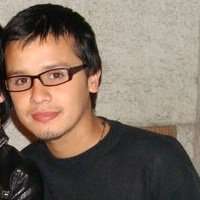Murder of Daniel Zamudio
Daniel Mauricio Zamudio Vera (3 August 1987 – 27 March 2012) has become a symbol against homophobic violence in Chile after his 2012 murder. On 2 March 2012, Zamudio, a Chilean gay man, was beaten and tortured for several hours in the San Borja Park in downtown Santiago. The four attackers, allegedly linked to a neo-Nazi gang, attacked him after learning he was gay.[1] His death and all the media attention contributed to accelerating legislation against discrimination, as well as opening new doors of acceptance and tolerance of differences in the conservative country.[2]
Murder of Daniel Zamudio | |
|---|---|
 | |
| Born | Daniel Mauricio Zamudio Vera 3 August 1987 |
| Died | 27 March 2012 (aged 24) |
| Cause of death | Homicide |
| Parent(s) | Ivan Zamudio |
Murder
According to Zamudio's parents, Zamudio was subjected to violence in the past because of his sexual orientation.[3] On 2 March 2012, Zamudio was attacked and severely beaten for six hours until he was unconscious.[1] He was taken to the Hospital Emergency Public Assistance in Santiago with traumatic brain injury, a broken leg and cuts on his stomach resembling swastikas made with broken bottles.[1] Cigarette burns were found in different parts of the body.[4] From his injuries, the young man died 25 days later in the Hospital Emergency Public Assistance of Santiago.[5][6]
Aftermath
After Zamudio's death, Chilean president Sebastián Piñera urged parliament to speed up the adoption of the law on hate crimes, which had been on the shelf for over seven years. The law would ban discrimination based "on race, ethnicity, religion, sexual orientation, gender, appearance, or handicap."[1] Adoption of the act was actively opposed by several churches which argued that the law could set a precedent for the legalization of same-sex marriage.[2] In July 2012 the law was passed, signed by the President and entered into force.[7]
Murder trial
On 17 October 2013, all four men were found guilty of first-degree murder. Judge Juan Carlos Urrutia pronounced that Patricio Ahumada Garay, Alejandro Angulo Tapia, Raul Lopez Fuentes and Fabian Mora Mora were guilty of a crime of "extreme cruelty" and "total disrespect for human life.[8]" On 28 October, Ahumada was sentenced to life imprisonment, Angulo and Lopez were sentenced to 15 years, and Mora, the youngest of the four, received 7 years because of his cooperation with investigators and his lack of prior convictions.[9][10][11]
See also
References
- The Week, "International News: Hate Crime Punished," 8 November 2013.
- "Chile's hate crime law passes after seven years". BBC. 10 May 2012. Archived from the original on 29 September 2012. Retrieved 16 July 2012.
- "Chileans voice outrage after gay man brutally beaten". BBC. 7 March 2012. Archived from the original on 29 September 2012. Retrieved 16 July 2012.
- "Muere Daniel Zamudio víctima y símbolo de la violencia homofóbica". Archived from the original on 29 September 2012. Retrieved 16 July 2012.
- "Des milliers de Chiliens aux funérailles de Daniel, jeune gay battu à mort". Têtu. Archived from the original on 29 September 2012. Retrieved 16 July 2012.
- "Chile calls for a new law after gay attack".
- "Chile's Pinera signs hate-crime law after alleged neo-Nazis kill gay youth in brutal murder". The Washington Post. Retrieved 25 July 2012.
- "Daniel Zamudio Verdict: 4 Chilean Men Found Guilty In Gay Man's Murder". The Huffington Post. 17 October 2013. Retrieved 17 October 2013.
- "Chile: 4 sentenced in brutal murder of gay man".
- "Chilean Gets Life Over Murder Of Gay Man Daniel Zamudio". UpdatedNews.ca. 29 October 2013. Archived from the original on 14 July 2014. Retrieved 29 October 2013.
- Gideon Long (28 October 2013). "Daniel Zamudio: The homophobic murder that changed Chile". BBC News.